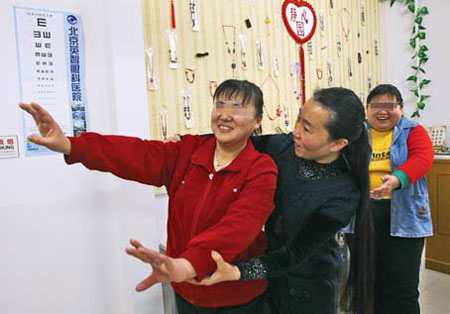Mental healthcare emerges from the shadows
 0 Comment(s)
0 Comment(s) Print
Print E-mail China Daily, February 3, 2012
E-mail China Daily, February 3, 2012
Busy, and paid less
At 10 am on a Monday in January, some patients were taking a walk outside Huilongguan Hospital, in Changping district. Their blue and white pajamas peeked out from their winter coats, identifying them as patients.
Wang Mei, one of the nurses in charge of the group, was preparing for a clay-modeling class that would start when her patients returned inside. "Our section has 62 patients right now. Compared with nurses in general hospitals, we bear more mental stress. Only three nurses for night duty, but we should take care of about 60 patients," she said.
Nurses are responsible for all of a patient's daily needs, including bathing, combing hair and trimming fingernails. Despite such regular and close contact, they sometimes face physical risks.
Wang said a male patient once grasped her throat, and she couldn't breathe. "I was scared at the very beginning, but soon calmed down and pressed an alarm ring. A security guard saved me," she said. "Not all nurses can bear that."
Yang, the hospital president, said about one-third of nurses quit every year. Psychiatrists are paid less than physicians in general hospitals. "They earn half but do more work," Yang said. "Because of that, fewer students choose to learn psychiatry, and some medical colleges have even canceled the subject."
China's CDC has no specific information on the colleges or number of medical students, but did say the country has about 20,000 psychiatrists and that at least 56 million people need treatment for mental illness but never receive it.
Transition, guidance
While more mental patients are seeking professional help from psychiatrists, psychologists and the like, leaving the hospital poses its own problems.
"Some patients can't receive professional medical care at home and have to stay in hospitals for years," said Nan Zhenguo, a psychiatrist in Huilongguan Hospital. "Mental disease rehabilitation centers will help those patients be successful back home. And the stress on mental hospitals will also be relieved."
He said that rehabilitation therapy centers have been widely promoted in Western countries as the best way to help mental patients lead normal lives. "But in China, they are still underdeveloped," he said. Jingxinyuan is the country's only such center with the assistance of psychiatrists.
An Ying, 37, gets help at Jing-xinyuan five days a week. "I love to be here with our teachers and friends. We share our experiences and can also get medical help in the residential area. It's much better than staying in the hospital."
An, who taught in a kindergarten, was diagnosed with schizophrenia at age 23. She spent three months at Huilongguan Hospital and now takes her medicine on time every day.
After leaving the hospital, she said, she could stick with a task or activity for only one hour before growing anxious. Now, with rehabilitation training, she can participate at the center for more than two hours.
The center provides several classes, including reading and homemaking, to help its patients become self-sufficient. Activities run from 9 to 11 am and 2 to 5 pm. An and her patient-friends are there every day, and they can contact a teacher directly if needed. Doctors and nurses from Huilongguan come to give professional medical guidance, individually and in group sessions, every week.
"Medical help is quite essential to the patients," nurse Zhao Jing said. "Every Wednesday is doctor's day. Patients and their family members will come and we do discussion face-to-face, which is very effective to improve their mental condition."
Zhao believes that rehabilitation therapy is the best way to help mental patients back into society. "Some patients stay in the hospital for more than two decades, which only makes their social ability worse," she said.
Before Jingxinyuan was established, many patients could only stay at home, and their family members often formed support groups. They gathered regularly with others in the same situation to share what they had learned from doctors and books and to help each other.
That's still the best option for thousands in Beijing who need mental rehabilitation. Jingxinyuan can accommodate only 15 patients.







Go to Forum >>0 Comment(s)